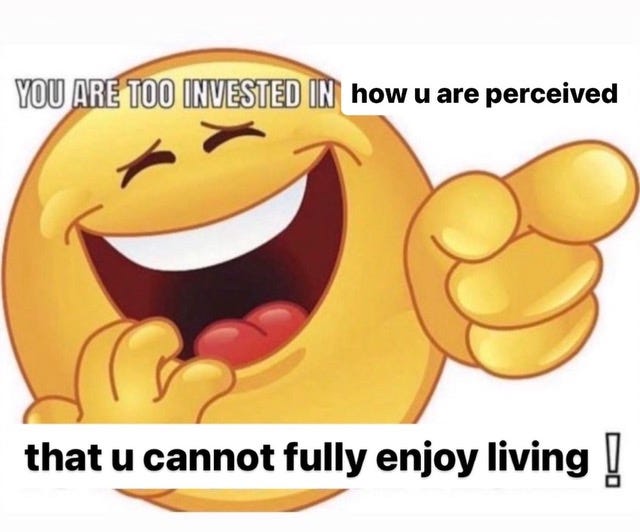On failure (both real and perceived)
How much of our "failure" is true inefficacy, versus the result of placing undue pressure on ourselves?
I’ve been motivated and (at least internally) defined by my achievements for as long as I can remember. “I’m like a border collie,” I told my partner recently while we were folding laundry. “I need something to work toward, or I’ll lose my mind.”
And lose my mind, I have. After buying a house all on my own last year and quitting a (relatively) well-paying job to work for myself full-time, I told myself I’d take a break from pursuing any lofty goals for a while and instead allow myself to breathe a bit. It’s good to bask in your successes, after all, and no one can be “go go go” all of the time.
It was nice at first. But it’s been nearly two years now, and I haven’t come up with a big new objective. Gradually, a mixture of existential worry and general annoyance has crept into my subconscious, prompting me to wonder what the heck I’m doing with my precious time and whether I’ll be glad I did those things when I eventually—decades from now, ideally—die.
So many people in my personal life and online seem to be accomplishing so many things. They’re having kids while working full-time. They’re getting book deals. They’re going to grad school. They’re attending artist residencies. They’re opening businesses. They’re purchasing fixer-uppers and then going about the process of fixing them up. And while I don’t want most of those things for myself, I can’t help but feel a stab of envy and shame when I see others achieving them. They must be so excited, I think. They must be so proud of themselves.
And the worst one: I bet everyone’s proud of them.
As they should be, of course. If your friends aren’t proud of you when you publish a book or have a baby or attend an exclusive residency, you should get new friends. But what about those moments in between? During those moments in which we aren’t achieving anything particularly noteworthy—those very normal moments, I’m insisting with gritted teeth—where should our sense of personal validation come from?
It can’t come from others, I’m realizing. It’s just not sustainable. We can get nice comments on our writing, accolades from our bosses, and kind texts about the bread we baked and shared with friends, and all of those things are good and healthy—but they are not enough to feed our self-worth.
This has been a tough pill to swallow, not only throughout the last year of my ambition hiatus, but also as we’ve approached 2024. I love New Year’s Eve for a lot of reasons, but I especially enjoy using it as an opportunity to check in with myself and create new goals. I always start the year with a shiny new objective, and I always achieve that objective in time…or at least I always did, before 2023.
In an effort to step away from big ambitions and instead enrich my life in small ways, I started 2023 with a mini bucket list of sorts. The list contained things like making $10,000 more freelancing than I did in 2022; reading the Communist Manifesto so I’d know what the heck people were talking about when they griped about it; and establishing a consistent creative writing practice. Some things on the list—like trying an Outback Steakhouse bloomin’ onion and going on a solo writing retreat—were relatively easy for me to cross off. But I failed to accomplish others. I fell about $2,000 short of my income goal. I never formed a super consistent personal writing practice. And, inexplicably, I stopped reading the Communist Manifesto about 90% of the way in.
About two days into crying and journaling mournfully about my income failure, I started to wonder why I cared so much about it in the first place. I wasn’t saving up for anything in particular, and I was fairly financially comfortable, so why was a year-over-year boost in net gain so important to me? And then I realized: Failing to meet my goal meant there would be no bragging about it on social media, or telling my parents I’d done something that they should be proud of, or showing my friends I was good at freelancing. In short, there would be no external validation that I’d done a good job, or that the way in which I’d spent my time was valuable.
The timing of this realization could not have been trickier. With 2024 just around the corner, I’m struggling to come up with a goal that motivates me. None of the things I want to (or feasibly can) achieve at this stage in my life are very flashy or laudable. I want to contribute to my retirement fund on a more consistent basis. I want to go on a few in-state weekend trips with my partner. I want to stop allowing myself to feel small. But who cares about those objectives, other than me?
In a journal entry from Dec. 4, I wrote: “Goals that are private are far less motivating because I won’t be sharing them with the world to receive praise, IG comments, etc. But who cares? After the praise is given, what happens? Nothing happens. Life goes on, and you have to live with yourself, so you’d better like the choices you’ve made.”
This, I think, was an Oprah “a-ha moment” for me. There’s little point in devoting time, energy, and other resources to a goal that doesn’t fulfill me. Receiving praise is nice, but knowing I’ve done something that feeds my soul or meaningfully contributes to my life (or someone else’s) is much nicer. Best of all, working toward the latter means there’s no such thing as true failure; even taking incremental steps to enjoy or enhance life constitutes success.
I know that not everyone struggles with balancing internal and external validation the way I do. But I’d hazard a guess that it’s more common than some of us might assume. I’ve mentioned multiple times already that our capitalistic society places productivity, growth, and success (particularly of the financial variety) above all else, and I’ll probably mention it a million more times in the future. And none of us are immune to the neurochemical rewards associated with positive social feedback, especially when platforms like Instagram and LinkedIn place said feedback within constant reach. Creatives, I think, are especially susceptible to external validation cravings; after all, we often create to relate with others or share parts of ourselves with the world.
I hope that throughout 2024, I’ll learn to appreciate the quiet rewards of pursuing and achieving goals that aren’t particularly brag-worthy. I have the same hope for all my friends and fellow creatives who feel a bit empty without external reassurance that they’re doing a good job. It might be a bit uncomfortable; when we’re used to pulling our positive self-image out of other people’s praise, it can be difficult to begin turning inward instead. But imagine: What might we actualize when we stop pursuing the ever-shifting target that is other people’s praise and start focusing on our own fulfillment?
What’s been inspiring me lately:
✰ Brave the Wild River, a book by Melissa L Sevigny about the women who formally mapped the botany of the Grand Canyon. As I’ve mentioned in a previous issue of Creativity Under Capitalism, I’ve found myself connecting with creative nonfiction lately. This particular piece incorporates themes like resilience and carving one’s own path, which I think are particularly poignant given this issue’s topic.
✰ The concept of synanthropes, or creatures that “live near and benefit from humans and their environmental modifications.” These include raccoons, pigeons, and rats—critters I can’t help but love, both for their tendency to be misunderstood and for their ability to adapt to our bizarre (and often destructive) lifestyles.
✰ This dumb meme, which I guess is also relevant to this issue:









I'm still working on this daily. I want so badly for my own validation and self-worth to come 100% internally. It sucks that the world is seemingly against it. It's a personal rebellion, and I just do my best to keep picking up my sword.